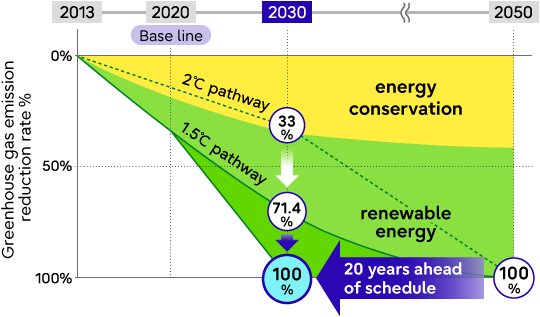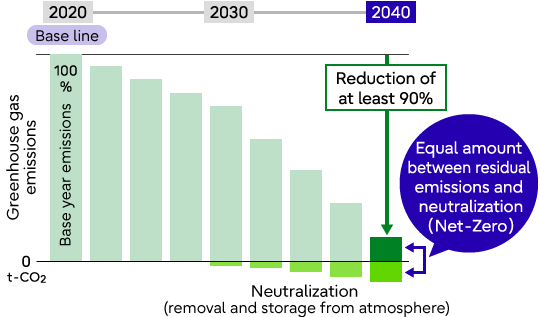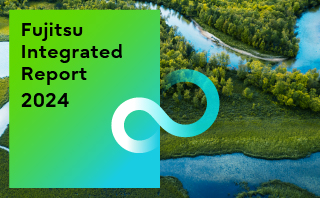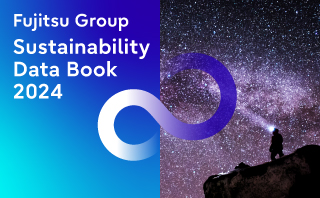-
Sustainability at Fujitsu Group
- Sustainability Management in the Fujitsu Group
- GRB(Global Responsible Business)Goals and Achievments for FY2022
- GRB(Global Responsible Business)Goals for FY2025
- Fujitsu's accessibility
- Stakeholder Engagement
- United Nations Global Compact
- SDG-related Activities in Fujitsu
- External Recognition and Awards
-
Global Responsible Business
- Environment
-
- Environmental Management
- The Fujitsu Group Environmental Vision on Climate Change
- Living in Harmony with Nature (Conservation of Biodiversity)
- Environmental Action Plan
- Environmental Data
- Environmental Communication
- Environmental Social Activities
- Disposal and Recycling of ICT products
- Environmental Considerations in ICT Products
- Governance
-
Data and Documents
- Fujitsu Group Sustainability Data Book 2024
- Social, Governance and Environmental data
- Independent Assurance Report

- GRI Standards / United Nations Global Compact (UNGC) principles Comparison Table
- SASB Standards Comparison Table
- Sustainability Information Disclosure Framework
- Link to regions responsible business reports
- Contact
- Sitemap
The Fujitsu Group Environmental Vision
“ Fujitsu Climate and Energy Vision ”
The Fujitsu Group has reassessed its social role in light of the escalating global commitment to achieving carbon neutrality. The Group has elected to fast-track its previous commitment to achieve “zero CO2 emissions within the Group by FY2050”, instead bringing forward committed Vision by 20 years to FY2030. The Group has set the additional target of reaching net-zero greenhouse gas emissions (*1) throughout the value chain by 2040.
- *1Net-zero greenhouse gas emissions: Reducing greenhouse gas emissions by at least 90% in the target year in comparison to the base year, and re-absorbing remaining emissions (of 10% or less) from the atmosphere through direct air capture (DAC) technologies or by planting trees.
The Importance of Responding to Climate Change
The Intergovernmental Panel on Climate Change (IPCC) Special Report “Global Warming of 1.5°C“ articulated the need to limit warming to 1.5 °C above pre-industrial levels and to achieve carbon neutrality by 2050. With social roles expanding and additional demands placed on companies to tackle climate change, in October 2021 the Science Based Target Initiative (SBTi) (*2) launched the world’s first Net-Zero Standard for companies to set net-zero strategies.
In order to resolve issues related to climate change, the Fujitsu Group decided to revise its previous commitment to "zero CO2 emissions by 2050", pursuing instead a more ambitious vision that requires the Group to look beyond social trends and become the very embodiment of a leading SX company that delivers carbon neutrality.
The Fujitsu Group Environmental Vision comprises three pillars, namely, Value chain: Achieve net-zero emissions, Mitigation: Contribute to a carbon-neutral society, and Adaptation: Contribute to climate change adaptation measures. The Fujitsu Group will be quick to leverage advanced DX technologies to tackle its own net-zero strategies, and will make the resulting expertise available as Fujitsu Group solutions for customers and society. In so doing, the Group aims to leverage its own business activities to contribute to climate change mitigation and adaptation.
- *2Science Based Target Initiative (SBTi): An initiative jointly established by the United Nations Global Compact, the World Resources Institute (WRI), and other organizations in 2015. It encourages companies to set GHG emission reduction targets consistent with science-based evidence to the level required by the Paris Agreement, validating targets that comply with criteria including indirect emissions not only within the company but also in the supply chain.
Concept
 Value chain: Achieve Net-zero Emissions
Value chain: Achieve Net-zero Emissions Mitigation: Contribute to a Carbon-Neutral Society
Mitigation: Contribute to a Carbon-Neutral Society Adaptation: Contribute to Climate Change Adaptation Measures
Adaptation: Contribute to Climate Change Adaptation MeasuresThree pillars of the Fujitsu Climate and Energy Vision
Achieving Net-zero Emissions in the Fujitsu Group Value Chain
In August 2017, the Fujitsu Group’s 2 °C-aligned greenhouse gas emission reduction target earned its SBTi validation. In April 2021, the Group obtained validation for its 1.5 °C ambition level (*3) which increased the target from 33% reduction in emissions to 71.4% throughout its business sites by FY2030, against a baseline of FY2013.
To accelerate the move toward carbon neutrality, the Group set a target to achieve net-zero emissions from the Group’s business activities by FY2030, and from the entire value chain by FY2040, thus earning Net-Zero Target validation from SBTi in June 2023.
- *31.5°C: According to a report by the Intergovernmental Panel on Climate Change (IPCC), a 1.5 °C increase in average temperature increases the risks of extreme weather, sea level rise, adverse health effects, food shortages, and water scarcity. The United Nations Framework Convention on Climate Change Conference of the Parties (COP) states that the increase in the global average temperature shall be limited to less than 1.5 degrees Celsius above pre-industrial levels in order to avoid the worst effects of climate change.
 Emission reduction of Fujitsu Group (Scope 1 and 2)
Emission reduction of Fujitsu Group (Scope 1 and 2) Emission reduction throughout the value chain (Scope 3)
Emission reduction throughout the value chain (Scope 3)Roadmap to Net-Zero
Targets for FY 2030
- Scope 1+2 emissions equivalent to Net-Zero (compared to FY 2020)
- Reduce Scope 3 emissions by more than 25% (compared to FY 2020)
Contributing to a Carbon-neutral Society
The Fujitsu Group contributes to the decarbonization of society by creating ecosystems with customers in a variety of industries and business types. Digital transformation (DX) is crucial to achieving this goal. By integrating advanced AI and other leading-edge digital technologies into a framework that transcends business, industry, and regional boundaries, the Group will reduce greenhouse gas emissions. This will be achieved through, for example, the optimal use of resources and energy across all social systems.
Contributing to Climate Change Adaptation Measures
We will leverage advanced forecasting technologies, incorporating sensing, high-performance computing (HPC) simulations, AI, advanced ICT and other digital technologies to effectively reduce greenhouse gas emissions. These technologies will be used to develop solutions for building resilient social infrastructure, ensuring a stable supply of agricultural products, and mitigating food loss. Through these efforts, we aim to minimize the harm caused by climate change to society and our customers.


